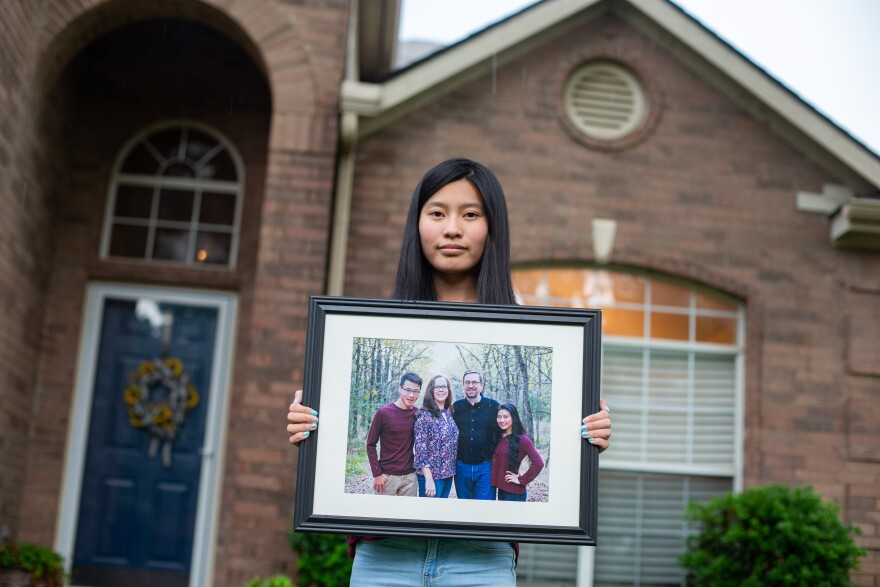For Cosette Eisenhauer of Euless to live not knowing her full birth story or birth parents is to live not knowing who she truly is.
"Being adopted is confusing especially whenever you start to understand that you were abandoned and that no one wanted you. It's hard to get over. It still is," Eisenhauer shared on her Instagram
Her life experience has led Eisenhauer to start using social media to share her adoptee story and create a space to talk about the strain adoptees sometimes feel.
"I started realizing that a lot of my friends didn't know much about adoption," Eisenhauer said. "They were pretty clueless about what adoptees went through so I decided to really share my story."

An Origin Story
The 20-year-old was born in Zhanjiang in Guangdong Province, China. Shortly after birth, she was dropped off at the Potou Hospital in the city, then sent to a police station and later transferred to the Zhanjiang Social Welfare Institute. There, she became what's called a "failure to thrive baby."
"Basically, a failure to thrive baby means you're just not getting enough love or care," she said. "So you're basically just dying in the orphanage."
Eisenhauer stayed at the orphanage for about two months before she was transferred to a foster family where she stayed until she was adopted at 14 months. But,her origin story can not be officially confirmed.
"It's been hard to wrap my head around it because really when I think about it, I really don't know any or much information from before birth through 14 months," she said.

When a family adopts a child, they are given orphanage records on their child. Many have shown that it is hard to rely on those documents for about children adopted from China.
"All the information that I have is all from like the Chinese government," she said. "So my birthday, June 9, could be completely wrong."
Eisenhauer describes adoption as an invisible trauma.
"People expect adoptees to always say all the pros of being adopted. 'Oh, I'm grateful that my parents who adopted me, I'm grateful that I got a second chance in life,'" she said. "But it's also filled with sadness."
On her Instagram page Eisenhauer makes graphics where she lists what adoption trauma looks like: feeling unwanted, insecure, abandoned, damage self-worth and identity, unstable relationships and struggle connecting to homeland.
Psychological Impact
"Many Chinese and Korean adoptees who were adopted by white families find that they're the only one in the community," said a professor at Southern Methodist University.
Satz has intensively studied and written about transracial adoption psychology. She said this topic hits close to home. Satz is the adoptive mother of a biracial daughter and son.
Through her research, Satz has identified two key points in time where the feeling of 'who they are, what is their identity?' manifests for individuals who are adopted.
"It's called genetic bewilderment," Staz said. "These questions arise over and over again, in different forms. For example, young people have one experience in adolescence when typically, people are thinking about their identity. Then when they get married and have children of their own, it presents itself in yet a different form."

Eisenhauer talked about feelings like this, citing her experience breaking down how many parents she has.
"I have three moms and like four dads," she said. "I always have to take the time and explain. Well, I have my foster mom, my biological mom and my adopted mom. I also have God, and my foster dad, adopted dad and biological dad."
When Mother's Day or Father's Day rolls around, Eisenhauer said she finds it very difficult to celebrate. She said she often cries and spends time in her room hugging her panda bears and mourning her biological parents — the parents she never got to meet.
Eisenhauer battles with abandonment and trust issues due to being adopted and not knowing her biological family.
Three years ago, she began looking for her biological family through Chinese databases and by taking DNA tests through 23&Me and Ancestry.com. She has many questions she hopes to get answered.
"There is always the sense of rejection and abandonment. Some adoptees have framed it as a primal wound, meaning I am cut off from my original mother," Satz said.
Supporting Adoptees
Eisenhauer said people can better support the adoptees in their lives by educating themselves and listening. Throughout her journey, she said the most important support that a her friends and family have provided her is comfort.
"Reminding me that my feelings are valid," she said.
Satz said parents also have an important role to play in their adoptive child's journey.
"They have to be open about sharing feelings," Satz said. "And have to reassure their children that it's okay and natural for them to want to find out about to their original parents, if they chose to do that,"

As for Eisenhauer, she said she will continue to create a community on social media. There's she'd found other adopted people in her situation and theycompare notes about their shared experience.
"I want to be identified as not necessarily the girl that was adopted so she should be grateful. It's more of the girl who is telling her story because she wants to help people understand," she said.
Got a tip? Alejandra Martinez is a corps member and writes about the impact of COVID-19 on underserved communities for �Ļ�ӰԺ. Email Alejandra at amartinez@kera.org. You can follow Alejandra on Twitter
�Ļ�ӰԺ is made possible through the generosity of our members. If you find this reporting valuable, consider today. Thank you.






